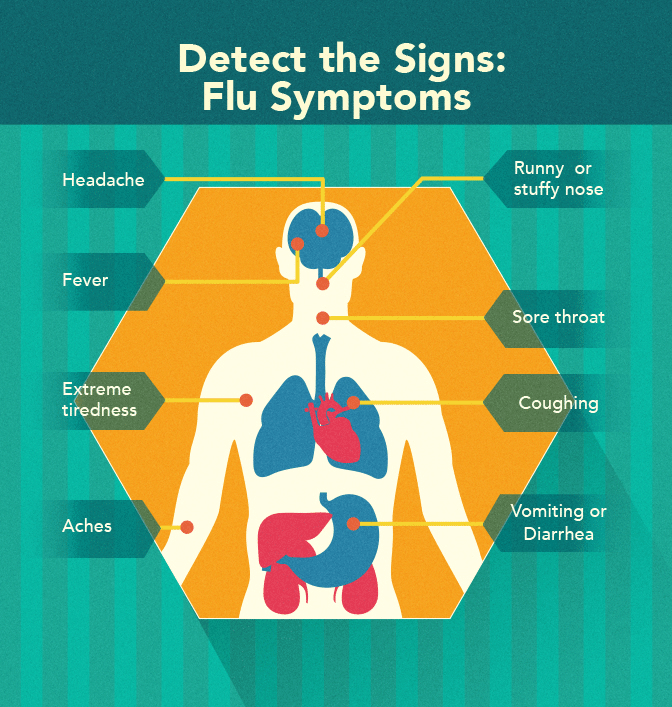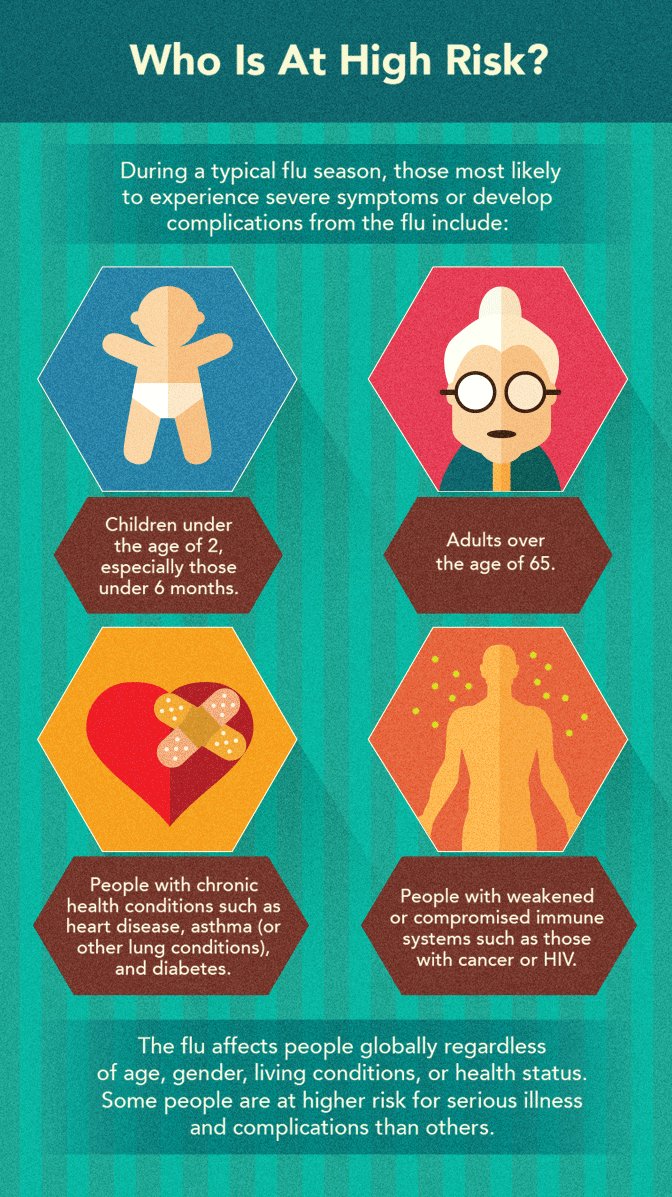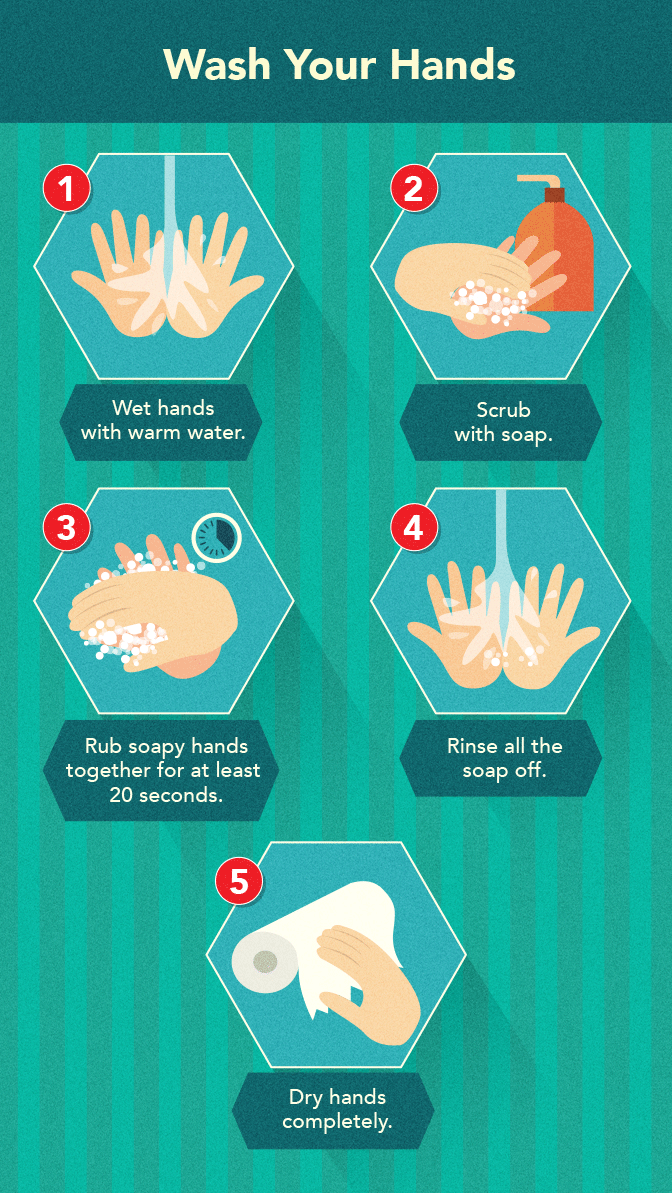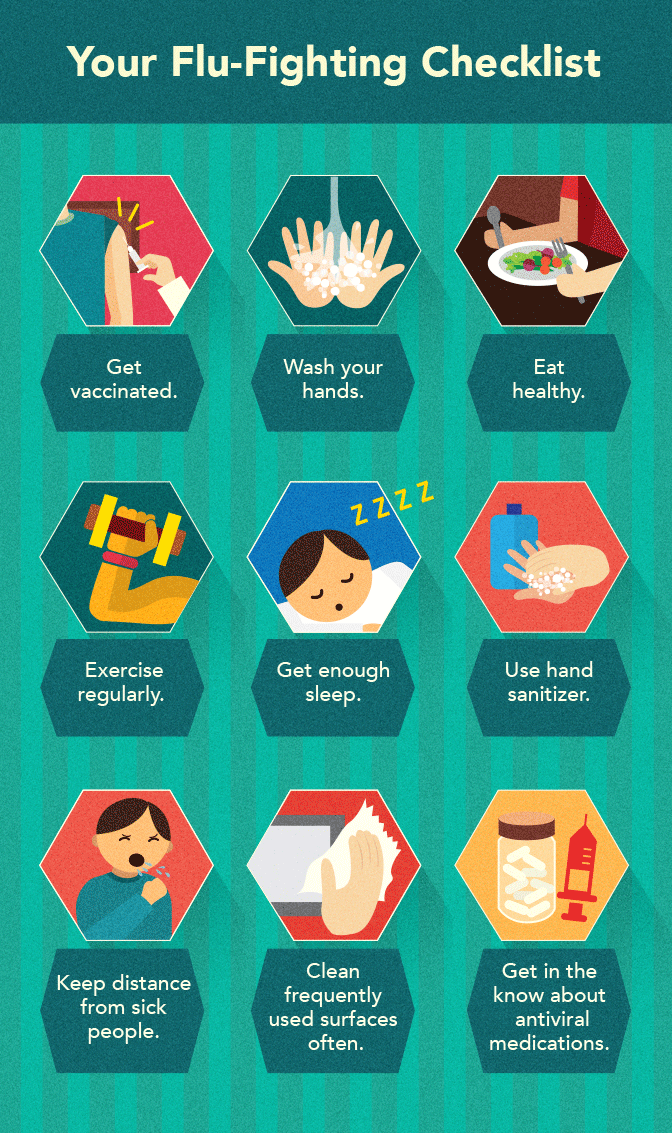Influenza, or the flu as it’s more commonly known, is one of the top 10 causes of death in the
United States when combined with pneumonia. Despite this sobering fact, many people believe the the flu is no worse than a bad cold and not a cause for concern. Although most healthy adults can recover
from the flu, not everyone does. Learning about this disease is crucial to keeping yourself and your family safe and healthy.
- Fever
- Body and muscle aches
- Cough (usually dry)
- Headache
- Fatigue or exhaustion
- Weakness
While vomiting and diarrhea are often thought of as the main symptoms of the flu, that’s a misconception.
Although some people with influenza may experience these issues, most do not. Children are more likely than adults
to experience vomiting and diarrhea when they get the flu, but will have respiratory symptoms as well.
What many people label as the flu is actually gastroenteritis, commonly called the stomach flu.
Gastroenteritis can be caused by a variety of different viruses, but not influenza.


What You Can Do to Protect Yourself
The flu is no laughing matter. So what can you do to protect yourself and your family?
While nothing can guarantee you will not contract the flu, there are many precautions known
to decrease the chances of getting (or spreading) it.
Get Vaccinated
The flu vaccine is recommended for nearly everyone six months of age and older. There are multiple
options to choose from. Beyond flu shots, there are two other options: nasal spray vaccine (called FluMist)
or the intradermal vaccine, which is a shot injected with a very small needle into the skin, causing far
less pain than a traditional shot. The high-dose flu vaccine is available for older adults and
a preservative-free option is available for those that are concerned about thimerosal or other
ingredients in the traditional flu shot. Talk to your health care provider about which option is right for you.
Wash Your Hands
This seems simple, but many people don’t wash their hands often enough or correctly, so they’re
spreading germs without really knowing it. To wash hands correctly, use warm water, scrub with soap
for at least 20 seconds (long enough to sing the “Happy Birthday” song twice), rinse all the soap off,
and dry hands completely. Don’t forget fingernails and thumbs. Thumbs are necessary for nearly everything,
but often they don’t get cleaned well when just rubbing the palms together during hand washing.

When buying hand soap, look for products without “antibacterial” on the label.
Increasing evidence suggests the chemicals used in antibacterial soaps (specifically triclosan)
actually contribute to antibiotic resistance. Antibacterial soap is no more effective than regular soap.
Hand washing doesn’t work due to the soap killing germs, but rather because the lather, friction,
and eventual rinsing washes the germs away.
Eat a Healthy Diet and Exercise Regularly
Staying healthy is essential to avoiding illness. If muscles are weak and diet is poor, the
immune system won’t be as strong as it could be, leaving you with an increased risk of getting sick when exposed to germs.
Be sure to eat a well-balanced diet full of fruits and vegetables. Try to incorporate foods spanning the colors of the
rainbow to get all of the essential nutrients. Minimize sweets and fried or high-fat foods. Stay as active as possible
by aiming for a minimum of 30 minutes of exercise per day.
Get Enough Sleep
Studies show getting adequate sleep is just as essential as a healthy diet and exercise for keeping the
immune system strong. With enough sleep, the body has time to rest and heal. Without adequate rest time, there’s
increased stress on the immune system and it won’t be able to function as well as it should. Most adults need
between six and eight hours of sleep each night.
Use Hand Sanitizer
Not everyone has access to soap and water when away from home. Alcohol-based hand sanitizers can effectively
kill the flu and most other germs. Toss it in a purse or backpack and use whenever necessary to decrease chances
of getting sick. An important note to remember: if hands are visibly soiled, soap and water are needed to clean them.
Hand sanitizer just won’t cut it.
Keep Your Distance From Sick People
This one can be difficult. Unfortunately, there’s no controlling what other people do.
A co-worker may decide to come to work when she is sick or you may have to stay home to care for
your sick child. But when possible, try to minimize interaction with people who are ill. When
direct contact with someone who’s sick is unavoidable, be sure to wash your hands
right away and try to avoid being coughed or sneezed on.
Clean Frequently Used Surfaces Often
Influenza can live on surfaces for two to eight hours, which means it can linger
anywhere without any detectible signs. Remember to clean high-traffic surfaces – especially
during cold and flu season – to prevent those germs from spreading. Items such as cell phones,
doorknobs, computer keyboards, and faucet handles are hotbeds for germs, but are frequently
overlooked during routine cleaning.
When it comes to disinfecting surfaces at home, school, or the office, be sure
to purchase products that are EPA-registered to kill the influenza virus. However,
even just using soap and water to clean surfaces and other items, like toys, can drastically
reduce the number of germs in a specific environment and help keep everyone healthier. Harsh
chemicals aren’t necessary to get things clean. Keep in mind that after washing everything
thoroughly, you should rinse and dry completely.
Talk to a Healthcare Provider about Antiviral Medications
This doesn’t apply to most people, but if you or someone you know lives with a chronic medical
condition that increases the risk for serious complications from the flu, talk to a healthcare provider
about taking an antiviral medication (such as Tamiflu) if exposed to the virus. Have this discussion at the
beginning of flu season or even before it starts, to be prepared if and when exposed. Some people at high
risk are not able to get the flu vaccine, so taking antivirals to help prevent influenza may be the only option.
Typically they are prescribed when someone in the household or a close contact has been diagnosed with the flu.
Even following all of these steps won’t guarantee a lifetime of flu prevention. However,
taking these precautions gives the best possible chance to avoid the flu or recover from it quickly
if it is contracted. If you think you may have symptoms of the flu, contact your health care provider as
soon as possible. Treatments may be available depending on your health and age, but they are more effective
when started sooner rather than later. Influenza is a real threat to millions of people across the globe.
Don’t take it lightly.

Embed the article on your site

